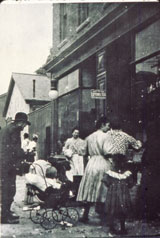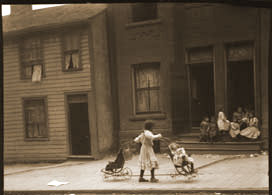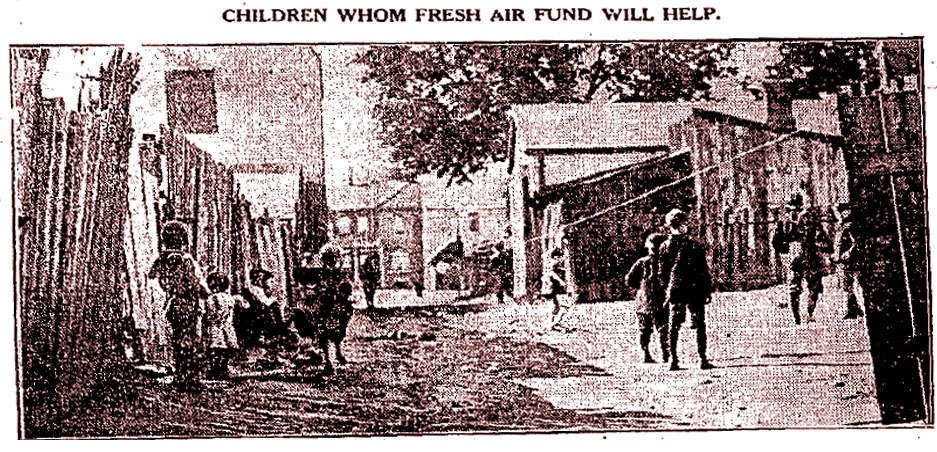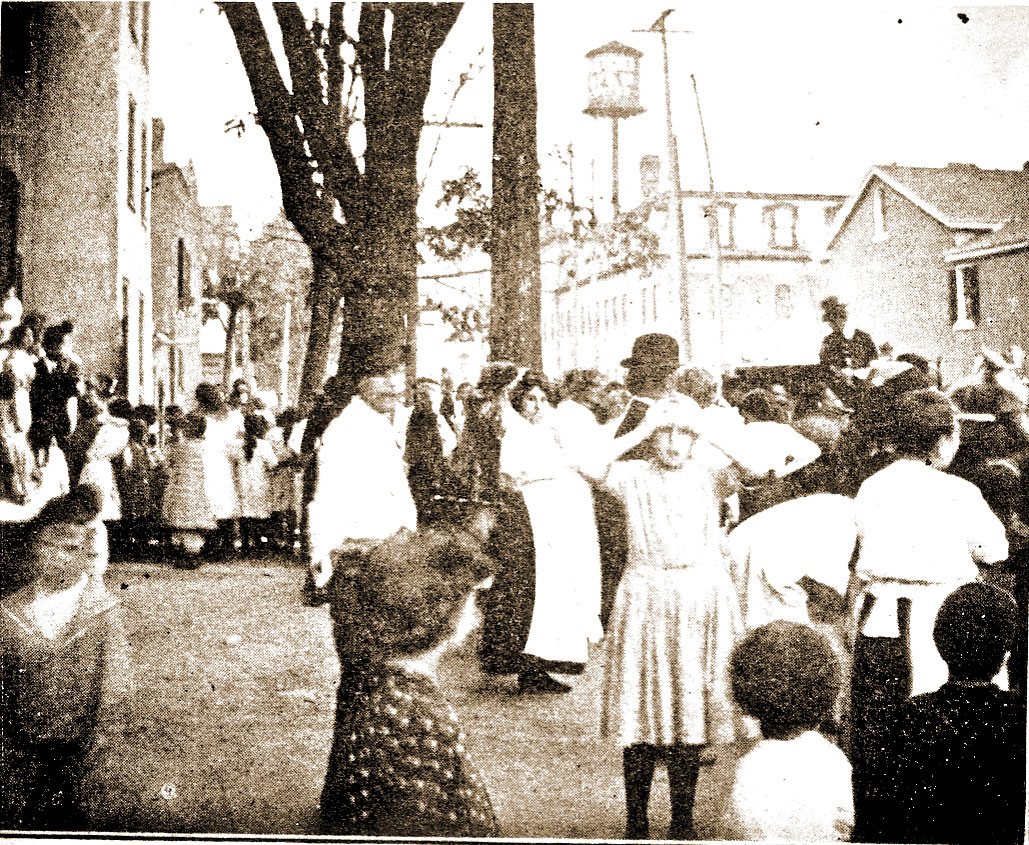 Suffering was Terrible — Little Children Lay Naked on the Bare Earth — Their Parents Half-Clad, Lay Beside Them — No Breeze in Narrow Alleys
Suffering was Terrible — Little Children Lay Naked on the Bare Earth — Their Parents Half-Clad, Lay Beside Them — No Breeze in Narrow Alleys
From The Toronto Star, July 4, 1911
If you really want to appreciate what a heat wave means, go through “The Ward.” You will see sights there that you have never seen before, and that you would scarcely believe if you didn’t see them yourself.
A Star representative made two trips through the district yesterday, one if the afternoon, the other late at night. The latter was much more enjoyable, if you can use that term in this connection at all. The darkness and the moonlight made a favourable setting and at least half concealed some of the most unpleasant features.
One thing must be said: in spite of the terrific heat, and all the physical discomforts, there was no sign of ill-nature. The streets were crowded to overflowing with men, women and children, with babies too numerous to begin to count; whole families were lying out in front of their houses on the bare earth; the heat was stifling, and the stench almost unendurable, but in all the trip one did not see one quarrel, or even an altercation, beyond the excited talk always indulged in by foreigners, and which always sounds like a dispute to an uninitiated person.
EVERY PLACE CROWDED
The Star man entered “The Ward” at the head of Centre Avenue, just behind the new hospital. As far down the street as he could see there were people, people, people. The yards were full of them, the sidewalks were full of them, the road was full, too.
In the hospital grounds a group of 20 Italians were playing a modified form of lawn bowling, with as much unconcern as if it had been seven o’clock in the evening, and not nearly midnight.
On the two corners of Centre Avenue are stores, and, as in the case all through “The Ward,” the shops were popular congregating points. In front of one there were 33 people. Two of them, a man and a woman, sitting flat on the ground, must have been over 80 years of age. They were mopping their faces with a big cloth, and seemed to take no interest in the proceedings at all. In spite of the intense heat the woman wore a black head wrap and a heavy black dress. The other 31 frequenters of the store front were younger, and varied widely in years. There were seven babies, three in carriages and four sprawling in the dirt. Their clothes were a negligible quantity.
Two men were playing cards on a soap box and others were eating “hunks” of watermelon. The shop across the road had a similar crowd. The nearest point of comparison to this sight would be a scene in a new frontier town at night, with everyone gathering around the general store.
In the first block in Centre Avenue, there was a typical array of sleeping appliances. In front of three houses wee the dining room tables with the family spread out on them, apparently asleep. In front of four other places were mattresses, but in the majority of cases the people were lying right on the ground.
At the corner of Elm and Centre a small boy was asleep in the middle of the sidewalk, and passersby had to move out of his way. At this point two nurses hurried by on the road to a sick patient. Nurses always go in pairs at night in “The Ward,” not that there is fear of molestation, but ladies naturally shrink from going alone in a strange place at night, and “The Ward” is surely a strange place.
Just above Agnes Street and Centre was a woman with two children lying in a particularly dirty looking front yard. They had no pillows, no quilts, no conveniences of any kind. The mother wore a blue wrapper, the children wore absolutely nothing.
Agnes was the busiest thoroughfare. There was a queer collection of wagons and carts, most of them loaded with watermelons, which seemed to be the most popular delicacy in “The Ward,” and which sold “like hot cakes.”
Near the corner of Agnes and Centre Streets, the Star man, accompanied by hordes of children, peered into a basement bakery, where the loaves for today were being baked. Outside all was dirt, in the bake shop, however, scrupulous cleanliness was apparent. The loaves looked much like the ones in general use, except for a few extra fancy touches. The Jews are essentially simple-minded people, with the tastes almost of children, who are tickled with a little twist on the bread.
THEATRE WAS CROWDED
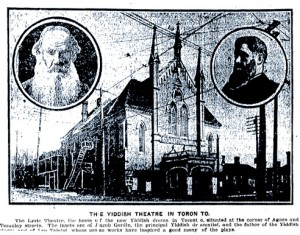 It looked as if the whole population of “The Ward” was out on the streets, but The Star man found that there were a few others yet. He dropped into the Lyric Theatre, where a Yiddish Stock Company was playing. It is quite a large place, and it was crowded to the doors. The manager informed The Star that it was a special benefit performance, to secure enough money to send the leading actor in the stock company away for his health for six weeks. After one had been in for two minutes, one did not wonder that the actor needed a holiday, and was of the opinion that he would probably need one longer than six weeks.
It looked as if the whole population of “The Ward” was out on the streets, but The Star man found that there were a few others yet. He dropped into the Lyric Theatre, where a Yiddish Stock Company was playing. It is quite a large place, and it was crowded to the doors. The manager informed The Star that it was a special benefit performance, to secure enough money to send the leading actor in the stock company away for his health for six weeks. After one had been in for two minutes, one did not wonder that the actor needed a holiday, and was of the opinion that he would probably need one longer than six weeks.
The heat in the theatre can be compared only to that in the Black Hole of Calcutta. It defies description. IT could be seen best in its results. All the men in the audience had their coats off and were then mopping their faces continuously. The ladies, and there were lots of them, quite a well dressed crowd especially in the boxes, wore the latest summer dresses, and fanned themselves incessantly.
The heat, however, did not detract from the interest in the play. It would be hard to tell what it was all about, for The Star man left at what was probably a crucial moment. During the two minutes he was there, he heard peals of laughter from all parts of the house at witty sallies made by the actors. It must have been a very funny play, although an outsider couldn’t see it. An old woman sat rocking a cradle, an old man in heavy winter woolen clothes (who was the sick actor who is now to go on a vacation) wandered around the stage, making sundry remarks. The action dragged considerably, but the laughter continued, and therefore, it must have been a comedy. The old woman was on the point of taking the baby from the cradle when The Star man left. He had seen enough babies outside on the streets.
On Louisa Street he visited the premises of “The Canadian Soda Water Company, parties and weddings supplied.” At first The Star man thought there must be lots of social events in “The Ward” at present, for the plant was working overtime.
“No, it is the hot,” explained the proprietor. “I haf to vurk all night mit Isaacs here, to make stuff for the Hebrews to drink.” The stuff looked as palatable as most “pop.”
AWFUL IN THE SUNLIGHT
During the afternoon trip the ugliness and the hideousness of “The Ward” were still more apparent. There was no glamour of night, no darkness to hide up the utter filth, no moonlight to give the slightest glimmer of romance. The heartless sun blazed down on the unattractive streets, with their temperature of 103 in the shade and fully 118 in the sun. Block after block extended the squalidness. Occasionally we hear people say that really “The Ward” isn’t such a bad place after all, and that things are fairly clean there. On a cool afternoon you might be deceived into some such false idea, but the facts, as shown up by weather which drives the inhabitants into the open and reveals the secrets of indoors, are all too repellant. A trip through “The Ward” on such an afternoon produces a sensation of actual physical revulsion.
The first and the last feature is dirt; unlovely, sordid dirt. In the first place, the streets are dirty. Watering carts go there, but on such an afternoon as Monday, the water dries up in a few minutes, and the dust blows in clouds. Every alley, every passageway between houses was crowded with filth, the accumulation of the winter months, and this was blowing around with the comparatively clean dirt of the street.
The houses, also that is, the majority of them, were filthy. There was no use blinking at the fact, or trying to explain it away. There are a few exceptions; a few, very few houses showed signs of careful treatment, but they were hopelessly in the minority.
The Star man walked slowly up one street and down another; in a few places where the occupants seemed to be out for a time, he looked in, and could hardly wait a moment to investigate. Here is a hall, with black paper half hanging from the wall, a collection of rubbish on the floor, and an old, shaky staircase. Dickens has introduced us to strange and ugly homes. With Oliver Twist we have seen the interior of squalid dwellings; we have seen touches of low society with David Copperfield. None of Dickens’ houses, however, are worse than many samples in “The Ward.”
In one place, as The Star man was peering in through the semi-darkness in an apparently empty house, he saw a little child, without one stitch of clothes, come crawling along the uncarpeted floor, and behind him came his mother, a woman with a sad, worn face, without a spark of vivacity or interest.
STRANGE VARIETY OF COSTUMES
These were the most peculiar contrasts in costumes. To begin with, nearly everyone was sitting outside on their doorsteps, or right in the road. No one was working, men, women, or children. Most of them were only half clad. The children were not a quarter dressed; the older folks were a little better. Several women were sitting on their doorsteps with no shoes or stockings, with their skirts up to their knees. These details are given to show a real, unvarnished picture of “The Ward” on an excessively hot day. Half the world, they say, doesn’t know how the other half lives. It is certain that five-sixths of Torontonians have no idea of how the other sixth exists.
In ludicrous contrast to these deshabille costumes were two or three winter dresses. An old woman was walking along the sunny side of the street with a black covering over her head and a heavy shawl over her shoulder. Her skirt was of a heavy woollen material, suitable to the Laplanders or the Esquimaux. Another old man had a long overcoat nearly to his boots, and a heavy, stiff black hat. A beard covered all his face. He also was walking in the beams of the sun.
One species of humanity predominated — the babies. Before one double house there were three baby carriages and six babies, four in the perambulators, and two in the dirt of the front yard. In one block and a half on Teraulay Street there were 100 babies certainly not one year old. Fully fifty of them were crying lustily and were receiving no attention from their mothers.
The older children could not be counted. They were the only individuals in “The Ward” who were showing signs of activity. Most of them were quarreling. One little girl was beating another child with a dirty broom-end which she had picked up in the middle of the street. ♦
* * *
NAKED CHILDREN LAY OUT IN THE STREET
That Was The Only Way Many Residents in The Ward Could Sleep
HARD ON SICK CHILDREN
Their Life Depends on Getting Some Place Where There’s a Breeze
Children lay naked on the streets in “The Ward,” the foreign quarter of Toronto, last night. The heat was mitigated by no breezes on those crowded alleys. Parents, scantily clothed and gasping for breath, lay on the pavement with the children. Last night was oppressive on the lake shore, on water-sprinkled lawns, in high-ceilinged rooms amid the waving of fans. In “The Ward,” it was like the fiery breath of the stoke-room of a steamship.
Sick children will die if they do not get a change. Their parents cannot afford to send them out of the city. That is what the Fresh Air Fund is for. Hundreds of names of deserving little ones have been taken by the charitable workers of Toronto. They are waiting until the money is subscribed to give them a holiday. Send your contribution to the Fresh Air Fund, Daily Star, 18 King Street West, Toronto. ♦

